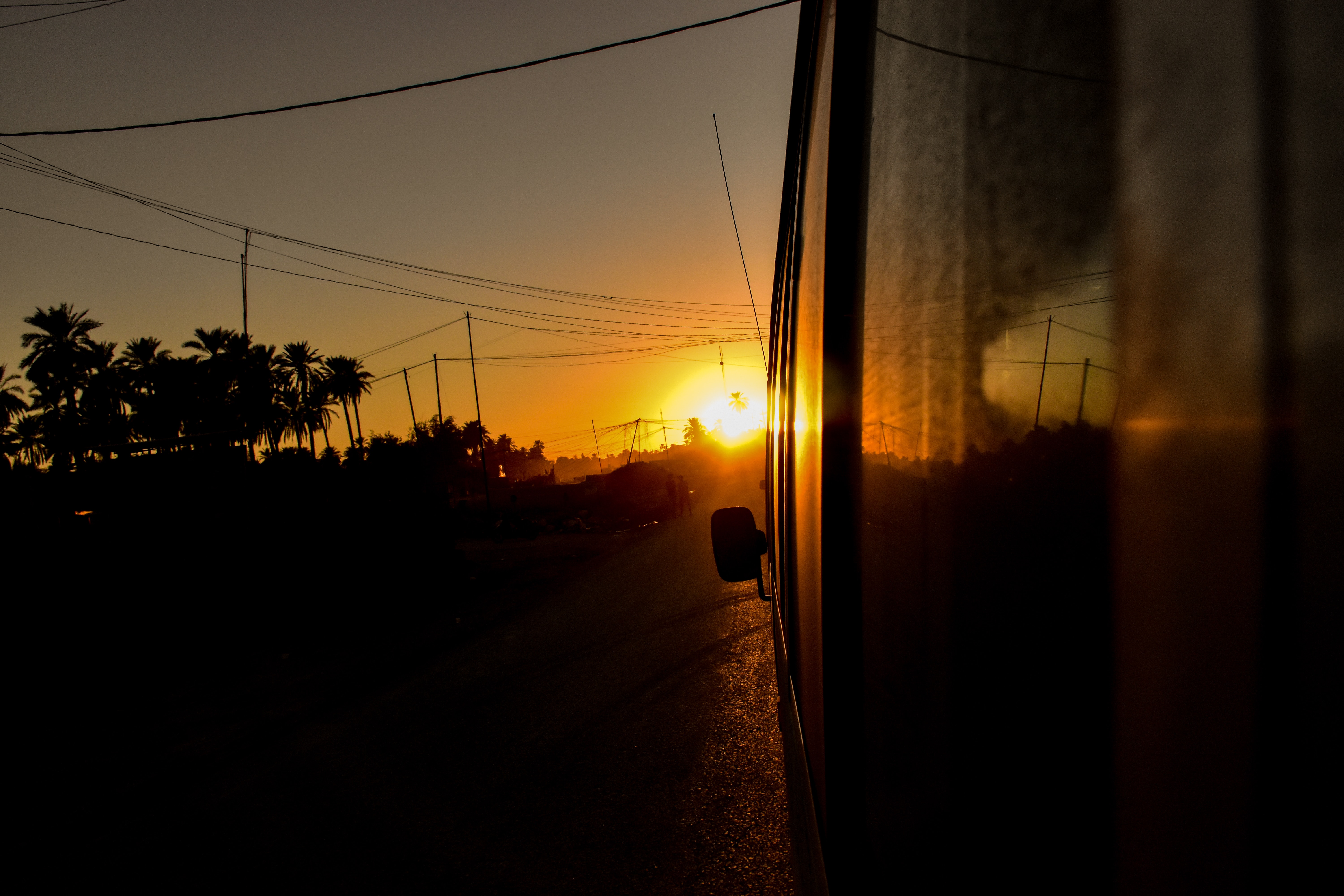“My father used to beat me with all his might... He vowed that he would take me and throw me into the waters of Khassa river and cut off my legs.” After what she heard from her father, Iman Abdullah, a 14-year-old girl from Kirkuk, became the second person to leave home after her mother.
Iman was nine years old when her parents divorced, and now that she is 14, she and her 10-year-old brother were living with her father and stepmother, but she left home on September 4th, 2023.
Iman studied until the fifth grade of primary school before her father expelled her from school. “He would constantly beat me in front of my mother. He was a very nervous person, cursing and reproaching us... We were very afraid of him. Not a day went by without a quarrel occurring in our house,” she added. “I remember during the last quarrel, my father cauterized my mother’s hand, so my mother decided to leave the house and did not return and divorced.”
Iman says that her father practiced violence against her and her brother as well, and that he tortured them. “One day he came home and was very angry and I did not know why. He cauterized my hand, and that hurt me a lot,” she continued, saying, “He vowed that he would drown me in Khassa river water and cut off my legs, and he said that he did not want to see me face.”
These threats came at the beginning of September, so on September 4, Iman took advantage of her father going to work at seven in the morning, left the house and then surrendered to the police.
Iman's father works in the military. After separating from his first wife (Iman's mother), he married another woman and has a child.
“My stepmother used to tell him that I was talking to boys, and then my father kept telling me that he did not want to see me face.”
On the same day that Iman left home, Kirkuk police handed Iman over to a civil society organization that works on the issues of girls and women who leave their homes due to domestic violence and threat.
My father kept telling me that he did not want to see me face
Iman's case is one of dozens of cases of abused women and girls in Kirkuk, and statistics from the organization that follows these cases indicate that 18 cases of running away from home were recorded across 2023 due to domestic violence and exposure to threats .
Siroud Ahmed, head of the Kirkuk branch of the Iraqi Al-Amal (Hope) Association, which works on the issues of abused women, pointed out that the 18 cases are mostly of teenage girls who have been exposed to problems with their families due to misuse of social networking sites.
“We have psychological and social researchers who, after receiving and registering the cases, speak with the abused women and girls. Some of them refuse to return to their families, for fear of being killed. In turn, we refer them to women’s shelters in Erbil and Sulaymaniyah,” Sirwd adds, “The biggest problem facing us is the lack of shelter in Kirkuk, so we are forced to send them to Erbil and Sulaymaniyah.”
Intisar Karim, head of the Women’s Empowerment Department in the Kirkuk Local Administration, said in a statement last October 2022 a shelter for abused women to open soon.
This comes at a time when the Kirkuk administration has been stressing for years about opening a special shelter for abused women within the framework of the tasks of the General Directorate of Provincial Police.
Brigadier General Amer Nouri Shwani, spokesman for the Kirkuk Police, told KirkukNow, “Any case we receive of this kind is referred to the community police and they decide on it. The problem we face is our inability to receive any abused woman in our shelter despite the completion of shelter construction and provision.” "There are some routine procedures that prevent us from receiving these cases."
“Community police often try to solve problems through tribal reconciliation, because these problems become more complicated for the families of abused women if their cases are referred to the courts. For example, if a woman runs away from home and her husband or father is arrested, the matter will be viewed as a disgrace and the problem will become more difficult to solve.”
These problems become more complicated for the families of abused women if their cases are referred to the courts
Regarding alternative solutions to the courts, Shwani said, “We ask them to sign a written pledge not to abuse their daughters or wives.”
Regarding the safety of women and girls after they return to their families, the Kirkuk police spokesman said, “We are constantly monitoring them. We have other procedures to help them if they are exposed to any harm.”
Shaima Muhammad (26 years old), another woman who left her husband because she was threatened. She was 18 years old when her father forced her to marry. She now has two children and lives in a women’s shelter in the Iraqi Kurdistan Region IKR, after she left home last February.
Shaima told KirkukNow, “In the first year of our marriage, our life was normal without problems, but over time his behavior changed and he started beating me and insulting me,” and she added, “Because my mother was not alive, I did not want to return home and live with my stepmother so I had to accept the violence being practiced against me... I did not want people to know about our problems, while my father and brother remained silent.”
Shaima’s husband is a construction worker and they lived in a rented house. Shaima says, “He used to spend the money he earned to buy alcohol and come back drunk and beat me and my children... There were often arguments between him and the landlords and we were kicked out of the house.”
Relations between the spouses have deteriorated since the beginning of this year, when the husband asked Shaima to file for divorce and return with her children to her father’s. Shaima decided to return, but she says, “My husband threatened me and told me that you must come back.”
Shaima says that she left her husband's house and then returned eight times, and the last time her father and stepmother asked her not to return again.
In February 2023, “At three o’clock in the morning, my husband came home drunk. He took out a knife and said that he would kill me. Early in the morning, I left the house secretly with my children.”
He took out a knife and said that he would kill me
Shaima and her children were referred by the police and women’s rights organizations to a women’s shelter in the IKR, where she now resides, but she is uncertain about the future.
Shaima registered a case against her husband, and after spending a month in prison, he was released on bail.
“The problem is that some abused women who leave their homes are exposed to more violence when they return,” says Ahmed.
“The solution is for families not to give their children absolute freedom, and at the same time not to confine them at home. Restrictions must be placed on the use of social media networks. Fathers and mothers must pay more attention to their children and allocate sufficient time to them,” according to Ahmed.
The lack of shelters in Kirkuk is difficult for official organizations and institutions. Ahmed explains, “If we have a shelter for women in every city, we can solve problems through dialogue without having to send them to another city, which leads to narrowing the scope of dialogue between the abused girl or woman and her parents or husband."
In addition to providing lawyers for cases, the Iraqi Al Amal Society also provides psychological and social researchers. All this is so that the problems can be solved and the abused woman does not have to stay in the shelter.
Shokhan Omar, a social researcher who works on cases of abused women, said that the 18 cases of girls and women are officially registered, while there are dozens of other cases that are not reported, nor referred to the police or courts.
The problem is that some abused women who leave their homes are exposed to more violence when they return
“Based on my field of work, I believe that cases of women leaving their homes due to violence have increased this year,” says Omar. “Marital infidelity, romantic relationships, drugs, and misuse of social media networks are among the main reasons.”
Of the total 18 cases registered by the Amal Association, six of them involve women and girls aged between 15 and 20 years. Ten of them refused to return to their families and were referred to shelters until their problems are sorted out.
"Some parents have a sense of responsibility. When the family encounters a problem, they contact us and ask for help to solve the problem," Omar said.
Iman, who lives in a women's shelter in the IKR, refuses to return to her family, especially after she registered a case against her father and had him arrested for a period.
“An organization is trying to solve my problem and return me to my father, who said he accepts my return, but I am afraid he will kill me.”
Note: Iman and Shaima are pseudonyms






